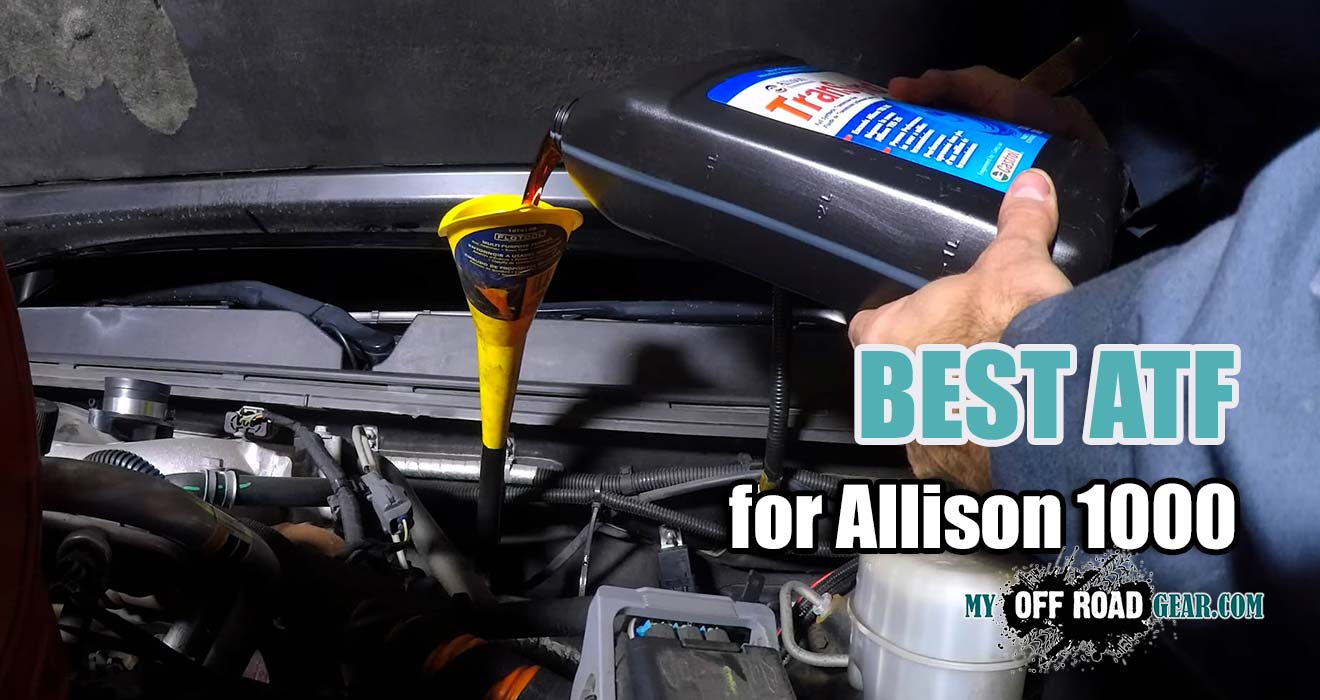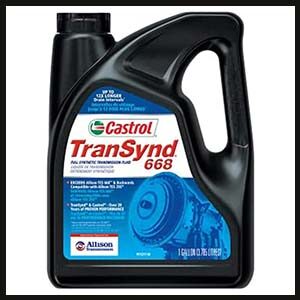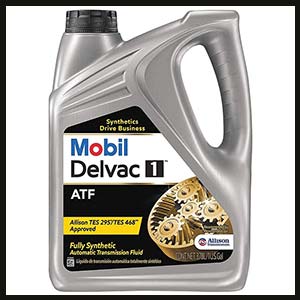Once you buy the vehicle of your dreams, you may think that you are going to ride around with it, expanding and conquering horizons. However, you need to realize that your ride is like a living organism. Thus, it requires ‘doctor visits’ and ‘vitamins’. You may already know that there are many different fluids without which your transmission won’t function well, and the Best Transmission Fluid for Allison 1000 is surely on the list.
Some people say that there is nothing more critical about the vehicle than engine oil, but transmission fluid belongs to the high-priority category. With the Best Transmission Fluid for Allison 1000, you will ensure that each and every metal part in the gearbox is working well and nothing wears out ahead of its time. Aside from that, the quality fluid will help you lower extremely high temperatures and even boost the fuel economy. Care to learn which option may suit your case and possibilities best? Proceed with the review.
Best Transmission Fluid for Allison 1000
| Product | Short Description |
|---|---|
|
Expert’s Choice
Castrol TranSynd 668 Transmission Fluid for Allison |
|
Mobil Delvac Transmission Fluid for Allison 1000 |
|
How to Choose the Best Transmission Fluid for Allison 1000
Are you in the market for transmission fluid for your Allison 1000? Selecting the right transmission fluid is crucial for the optimal performance and longevity of your vehicle’s transmission. With so many options available, it can be overwhelming to determine which one is the best fit for your specific needs. In this article, we will guide you through the process of choosing the best transmission fluid for your Allison 1000, ensuring that you make an informed decision that enhances the efficiency and durability of your transmission.
The Allison 1000 transmission is a popular choice for heavy-duty trucks and high-performance vehicles. It is known for its durability and ability to handle demanding conditions. To ensure the smooth operation and longevity of your Allison 1000 transmission, choosing the right transmission fluid is essential.
Understanding Allison 1000 Transmission
Before diving into the selection process, let’s briefly understand the Allison 1000 transmission. It is a heavy-duty automatic transmission commonly found in commercial trucks, motorhomes, and select high-performance vehicles. Designed to handle substantial power and torque, the Allison 1000 transmission delivers reliable performance and durability.
Importance of Transmission Fluid
Transmission fluid plays a vital role in the proper functioning of your vehicle’s transmission. It serves as a lubricant, cooling agent, and hydraulic fluid, ensuring smooth gear shifts and preventing wear and tear on internal components. Choosing the right transmission fluid for your Allison 1000 is crucial to maintain optimal performance and protect the transmission from damage.
Specifications and Compatibility
When selecting transmission fluid for your Allison 1000, it is essential to refer to the manufacturer’s specifications and compatibility guidelines. These specifications outline the specific fluid requirements and compatibility with your transmission model. Using a transmission fluid that does not meet the manufacturer’s specifications can lead to poor performance and potential damage to the transmission.
Types of Transmission Fluids
There are different types of transmission fluids available in the market. Let’s explore some of the commonly used ones for the Allison 1000 transmission:
1. Dexron-III/Mercon
Dexron-III/Mercon is a conventional automatic transmission fluid suitable for older vehicle models, including the Allison 1000. It offers good protection and lubrication properties, but it may not provide the same level of performance as newer fluid formulations.
2. Dexron-VI
Dexron-VI is a synthetic transmission fluid that offers improved performance and extended service life compared to Dexron-III/Mercon. It provides enhanced protection against heat, oxidation, and wear, making it a suitable choice for Allison 1000 transmissions.
3. Synthetic Fluids
Synthetic transmission fluids are formulated to offer superior performance and durability. They provide excellent protection under extreme temperatures and heavy loads. Synthetic fluids are often recommended for vehicles that operate under demanding conditions, such as towing or heavy hauling.
Manufacturer Recommendations
To ensure optimal performance and warranty compliance, it is advisable to follow the manufacturer’s recommendations for transmission fluid. Allison Transmission, the manufacturer of Allison 1000, provides specific guidelines on the type and specifications of transmission fluid to use. These recommendations are based on extensive testing and are designed to maximize the transmission’s performance and longevity.
Viscosity and Temperature Range
Viscosity refers to the thickness or resistance to flow of a fluid. It is crucial to select a transmission fluid with the appropriate viscosity for your Allison 1000 transmission. The manufacturer’s recommendations will indicate the suitable viscosity range based on temperature conditions. Using the correct viscosity ensures proper lubrication and performance under different operating temperatures.
Additives and Extra Features
Some transmission fluids come with additives and extra features that offer additional benefits. These additives can improve anti-wear properties, reduce friction, and enhance the overall performance of the transmission. When choosing transmission fluid, consider any specific additives or extra features that align with your vehicle’s requirements and driving conditions.
Changing Transmission Fluid
Regularly changing the transmission fluid is essential for maintaining the health of your Allison 1000 transmission. Over time, transmission fluid can degrade and lose its effectiveness. Follow the manufacturer’s recommended service intervals for fluid change and ensure that you use the appropriate transmission fluid when performing the change.
Maintenance Tips for Allison 1000 Transmission
In addition to choosing the right transmission fluid, here are some maintenance tips to keep your Allison 1000 transmission in optimal condition:
- Regularly check the fluid level and condition.
- Inspect for any leaks and address them promptly.
- Follow the manufacturer’s recommended service intervals.
- Avoid excessive towing or overloading beyond the recommended capacity.
- Drive responsibly and avoid aggressive driving habits.
Common Transmission Fluid FAQs
Is synthetic transmission fluid better than conventional fluid?
Synthetic transmission fluids offer improved performance and durability compared to conventional fluids. However, it is important to use a transmission fluid that meets the manufacturer’s specifications for your Allison 1000 transmission.
Can using the wrong transmission fluid damage my Allison 1000 transmission?
Yes, using the wrong transmission fluid can potentially damage your Allison 1000 transmission. It is crucial to follow the manufacturer’s recommendations and use the appropriate fluid that meets the specified requirements.
Can I change the transmission fluid myself?
While it is possible to change the transmission fluid yourself, it is recommended to consult the manufacturer’s guidelines or seek professional assistance to ensure proper procedure and fluid selection.
Why is using the right transmission fluid important for the Allison 1000?
Using the correct transmission fluid is crucial for maintaining the performance and longevity of the Allison 1000 transmission. The right fluid helps ensure smooth shifting, optimal lubrication, and proper cooling, which are essential for the transmission’s overall health.
What is the best transmission fluid for the Allison 1000?
The best transmission fluid for the Allison 1000 is the fluid that meets the specifications set by the manufacturer. Allison Transmission, the manufacturer of the Allison 1000, recommends using their own branded fluid, specifically the “Allison TES 295” or “Allison TES 389” fluid.
What are the characteristics of Allison TES 295 and TES 389 transmission fluids?
Allison TES 295: This fluid is designed for severe-duty applications and offers enhanced performance and protection against heat, oxidation, and wear. It meets strict specifications and is commonly used in heavy-duty applications such as towing, hauling, and commercial vehicles.
Allison TES 389: This fluid is recommended for general-duty applications and provides good performance and protection for normal operating conditions. It meets the manufacturer’s requirements and is suitable for various commercial and recreational vehicles.
Can I use other transmission fluids that meet the same specifications?
Yes, you can use other transmission fluids that meet the specifications set by Allison Transmission. However, it is important to ensure that the fluid you choose is certified to meet the TES 295 or TES 389 specifications. Using fluids that meet the manufacturer’s recommendations helps ensure compatibility and performance.
Are there any alternatives to Allison-branded transmission fluids?
While Allison-branded fluids are recommended, there are other reputable brands that offer transmission fluids meeting the TES 295 or TES 389 specifications. It’s essential to look for fluids from trusted manufacturers that clearly state their compliance with Allison Transmission’s specifications.
How often should I change the transmission fluid in the Allison 1000?
The recommended interval for changing the transmission fluid in the Allison 1000 can vary depending on factors such as vehicle usage, operating conditions, and the type of fluid used. It is best to refer to the manufacturer’s recommendations or consult with a certified mechanic to determine the appropriate change interval for your specific situation.
Can I mix different transmission fluids in the Allison 1000?
It is generally not recommended to mix different transmission fluids in the Allison 1000. Mixing fluids can lead to compatibility issues, reduced performance, and potential damage to the transmission. It’s best to stick with one type and brand of fluid throughout the transmission’s lifespan.
Can I change the transmission fluid in the Allison 1000 myself?
Changing the transmission fluid in the Allison 1000 can be a complex process and requires specific tools and expertise. It is recommended to have the fluid changed by a qualified mechanic or a service center with experience in working on the Allison 1000 transmission. They will ensure the proper procedure is followed, and the correct fluid is used.
Conclusion
Your manual or automatic transmission requires the same caution approach if you want it to serve its time and more. The Best Transmission Fluid for Allison 1000 will help reduce the temperatures that add up to the transmission’s parts and elements. Besides, proper lubrication and protection will serve the purpose right too. All it takes is to pick the fittest amount of the best available products on the market. Luckily, most of them are hand-picked for you already!





I’ve bookmarked this article for future reference. It’s refreshing to see a comprehensive guide specifically focused on the best transmission fluid for the Allison 1000. The pros and cons of each recommendation are well-explained, making it easier for readers to make an informed decision. Keep up the great work!